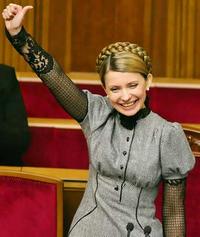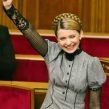
CAN UKRAINE’S CONSTITUTIONAL COURT BE UNBIASED?
Publication: Eurasia Daily Monitor Volume: 4 Issue: 75
By:

Today, April 17, Ukraine’s Constitutional Court (CC) began considering an appeal by a group of pro-government parliamentarians regarding President Viktor Yushchenko’s April 2 decree on the dissolution of parliament. The CC should decide not only on the question of early parliamentary elections, but also, indirectly, the fate of Yushchenko as president. If the CC’s verdict is not in his favor, it will mean that the president violated the constitution. Prime Minister Viktor Yanukovych has indicated that his Party of Regions (PRU) — which controls the largest caucus in parliament — will push for Yushchenko’s impeachment. If, however, the CC upholds Yushchenko’s decree then, Yanukovych argues, an early presidential election should be held simultaneously with an early parliamentary one.
Both Yushchenko and Yanukovych have pledged to obey any verdict of the CC. There are, however, doubts about the integrity of CC judges, as both sides to the conflict have been exerting serious psychological pressure on them. Several judges have reportedly received threats, one has been accused of corruption, and the CC chairman wanted to resign immediately after Yushchenko’s decree.
Chief Justice Ivan Dombrovsky tried to resign on April 4, but the CC voted to reject his request. Dombrovsky provided no public explanation for his decision, but the media reported that he took sick leave the same day his request was denied. A week later, Yushchenko’s Our Ukraine party (NU) issued a statement saying that Yanukovych had threatened Dombrovsky in a private conversation. NU did not specify the nature of Yanukovych’s alleged threats.
President Yushchenko met with CC judges in late March, several days before his decree to dissolve parliament, which prompted the PRU to accuse him of trying to exert pressure on the judges. On April 9, the PRU-dominated parliament, whose legitimacy Yushchenko has not recognized since April 2, passed a statement accusing Yushchenko of putting pressure on the CC. Yushchenko, parliament said, “openly meets with the judges, shamelessly imposing on them his view on the legality of his decree.” On the same day, parliament set up an investigation commission to check the allegations of PRU member Ihor Myroshnychenko that the Security Service (SBU) was wiretapping the telephone conversations of CC judges.
Meeting with his allies on April 10, Yushchenko expressed his concern over what he described as pressure on the CC. Yulia Tymoshenko, speaking at the meeting, made a statement essentially characterizing the attitude of both sides toward the CC. As the judges were being intimidated and bribed, she said, “The court is unable to make any law-based ruling.”
Tymoshenko spoke several hours after five out of the CC’s 18 judges had dramatically announced that they would refuse to work until the state guaranteed their security. After that, the government supplied the judges with guards. The five, four of whom had been appointed to the CC under the quotas of Yushchenko and NU, did not pretend impartiality. They said that Yushchenko’s decree was fully in line with the constitution. This prompted Justice Minister Oleksandr Lavrynovych to accuse them of violating the law on the CC by making their position public before the hearing of the case at the CC.
In a pre-recorded statement that aired on several TV channels on April 13, CC judge Syuzanna Stanik complained of being the target of a smear campaign. SBU acting head Valentyn Nalyvaychenko on April 16 announced that a relative of Stanik had illegally received property worth $12 million, apparently from the government. The Prosecutor-General’s Office on the same day, however, announced that it had investigated the bribery allegations against Stanik and found them groundless. Stanik accused the SBU of interfering with the work of the CC. This, however, did not prevent Yushchenko from turning to the CC with a request to consider the SBU accusations against Stanik and relieve her of the duties of judge-rapporteur. The Prosecutor-General’s Office, like the Interior Ministry, appears to be dominated by people loyal to Yanukovych’s coalition, while Yushchenko controls the SBU.
The Constitutional Court is not legally limited in its decisions by any timeframe, so it is entirely possible that no decision on the parliament dissolution decree will be passed by May 27, the date Yushchenko has chosen for the new elections. There are signs, however, that Yushchenko may back down as far as the election schedule is concerned. National Security and Defense Council Secretary Vitaly Hayduk was the first official from his team to openly admit the possibility of re-scheduling the election, speaking at a briefing on April 11. Yushchenko probably has no choice, as Yanukovych’s government has so far refused to allot funds to hold the election, and the local electoral commissions have not been formed on time.
(Channel 5, April 4, 9, 13, 17; ICTV, 1+1 TV, Ukrayinska pravda, April 10; NTN, April 13; ProUA, April 16)




